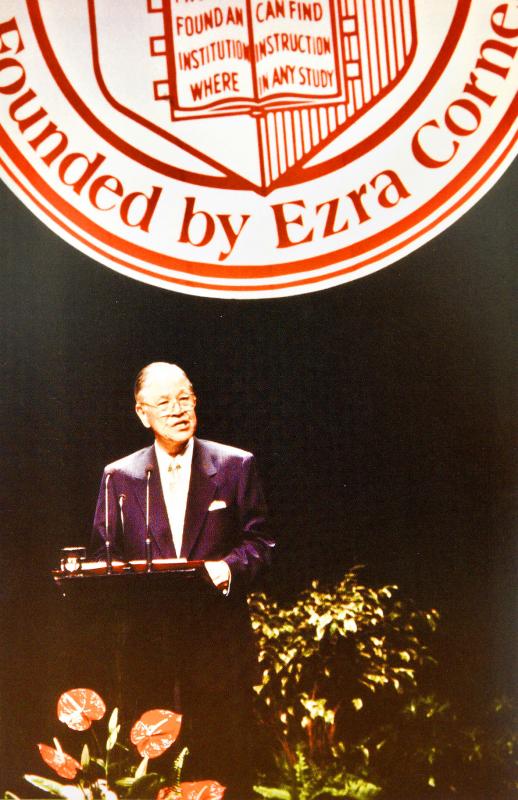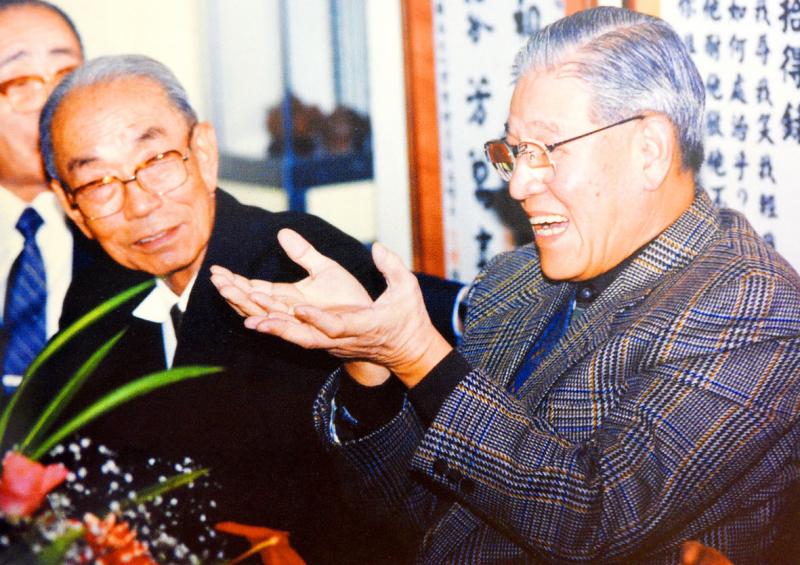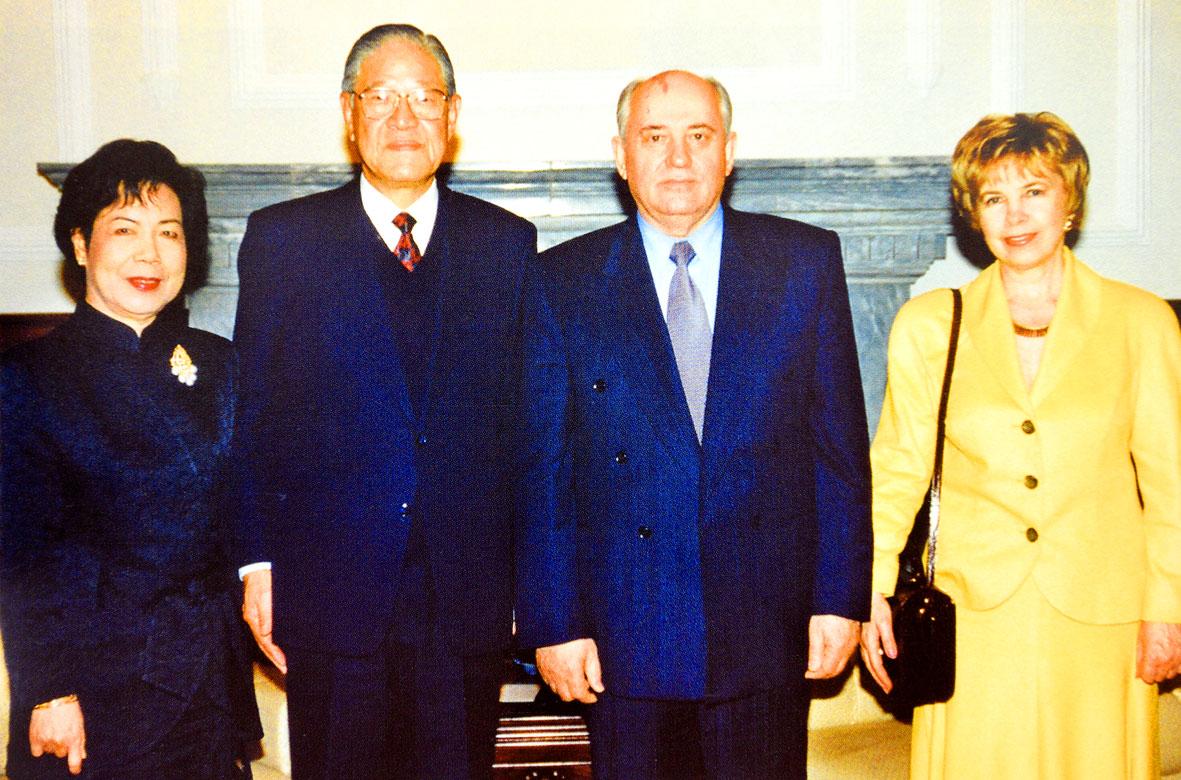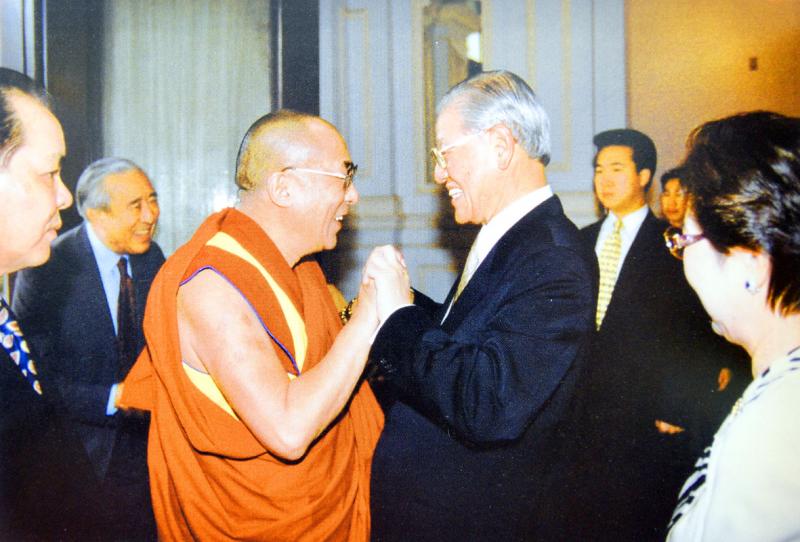Lee Teng-hui (李登輝), who was born on Jan. 15, 1923, in the farming community of Sanshi Village, Taihoku Prefecture — now New Taipei City’s Sanzhi District (三芝) — during the Japanese colonial era, and rose to become mayor of Taipei and not only the Republic of China’s (ROC) first Taiwan-born president, but its first directly elected one as well.
Educated in the Japanese educational system of the time, Lee, who spoke Japanese, Hoklo (also known as Taiwanese), Mandarin and English, won a scholarship to Kyoto Imperial University, but his studies were interrupted by World War II.
He earned a bachelor’s degree in agricultural science from National Taiwan University (NTU) in 1948, and appeared headed for an academic or civil service career, going on to earn a master’s degree from Iowa State University in 1953 and a doctorate from Cornell University in 1968.

Photo courtesy of Academia Historica
He worked for the US-sponsored Joint Commission on Rural Reconstruction and also taught at NTU and National Chengchi University.
After joining the Chinese Nationalist Party (KMT) in 1971, the following year he gained his first government appointment, as a minister without portfolio with responsibility for agriculture.
He served in that position until June 1978, when he was appointed mayor of Taipei, a post he held until December 1981, when he became governor of the then-Taiwan Provincial Government, serving until 1984, when he became vice president of the ROC.

Photo courtesy of Academia Historica
He succeeded president Chiang Ching-kuo (蔣經國), who died on Jan. 13, 1988, although the move was opposed by many Mainlanders within the KMT, including Chiang Kai-shek’s widow, Soong Mayling (宋美齡), who returned from the US to help other conservative Mainlanders to sideline Lee as president and block his accession to the KMT chairmanship.
However, Lee was deft enough to secure enough support to stay in office.
In 1991, he ended the Period of National Mobilization against Communist Rebellion and pushed for the re-election of the “1,000 year” National Assembly and the Legislative Yuan, whose members had served since 1948.

Photo courtesy of Academia Historica
He also oversaw a major reshuffle of the Executive Yuan.
In 1995, he became the first ROC president to publicly apologize for the 228 Incident, and also made waves by returning to Cornell University to deliver a speech.
The following year he became the first directly elected president after the Third Addition to the Constitution established that the nation’s president and vice president should be directly elected.

Photo courtesy of Academia Historica
His unparalleled contributions to democratizing the nation and his election that year earned him the nickname “Mr Democracy” from Newsweek magazine.
During his time as president and as KMT leader he favored highlighting Taiwan’s sovereignty and right to self-determination, and also pushed his special state-to-state model of cross-strait relations.
His relationship with the Democratic Progressive Party was highlighted by both rivalry and camaraderie, which is perhaps best exemplified by his collaboration with then-DPP chairman Hsu Hsin-liang (許信良) to freeze the Taiwan Provincial Government in 1997.
He was blamed by many hardliners in the KMT for the party’s loss of the presidency in 2000 to the DPP’s Chen Shui-bian (陳水扁), which eventually led to his being expelled from the party.
In 2004, Lee supported Chen’s re-election and in 2012 and 2016 stumped for Tsai Ing-wen (蔡英文) in her bids to become president.
Today, members of the DPP and pro-independence advocates see Lee as a visionary on the nation’s path to democracy and its efforts to achieve self-determination.
Democracy advocate Peng Ming-min (彭明敏), 96, said there were two contradictory identities in Lee — one was his status as a Taiwanese and the other was his position as KMT chairman.
The last time he saw Lee was at the founding of the Formosa Alliance in Kaohsiung, Peng said.
Lee made great contributions during Taiwan’s period of economic, political, cultural and social transformation, Peng said, adding that he believes Lee will always have an important position in Taiwan’s history.
Additional reporting by Lee Hsin-fang and Diane Baker
This story has been corrected since it was first published.

Auckland rang in 2026 with a downtown fireworks display launched from New Zealand’s tallest structure, Sky Tower, making it the first major city to greet the new year at a celebration dampened by rain, while crowds in Taipei braved the elements to watch Taipei 101’s display. South Pacific countries are the first to bid farewell to 2025. Clocks struck midnight in Auckland, with a population of 1.7 million, 18 hours before the famous ball was to drop in New York’s Times Square. The five-minute display involved 3,500 fireworks launched from the 240m Sky Tower. Smaller community events were canceled across New Zealand’s

The Ministry of Foreign Affairs (MOFA) yesterday said it is closely monitoring developments in Venezuela, and would continue to cooperate with democratic allies and work together for regional and global security, stability, and prosperity. The remarks came after the US on Saturday launched a series of airstrikes in Venezuela and kidnapped Venezuelan President Nicolas Maduro, who was later flown to New York along with his wife. The pair face US charges related to drug trafficking and alleged cooperation with gangs designated as terrorist organizations. Maduro has denied the allegations. The ministry said that it is closely monitoring the political and economic situation

‘SLICING METHOD’: In the event of a blockade, the China Coast Guard would intercept Taiwanese ships while its navy would seek to deter foreign intervention China’s military drills around Taiwan this week signaled potential strategies to cut the nation off from energy supplies and foreign military assistance, a US think tank report said. The Chinese People’s Liberation Army (PLA) conducted what it called “Justice Mission 2025” exercises from Monday to Tuesday in five maritime zones and airspace around Taiwan, calling them a warning to “Taiwanese independence” forces. In a report released on Wednesday, the Institute for the Study of War said the exercises effectively simulated blocking shipping routes to major port cities, including Kaohsiung, Keelung and Hualien. Taiwan would be highly vulnerable under such a blockade, because it

UNRELENTING: China attempted cyberattacks on Taiwan’s critical infrastructure 2.63 million times per day last year, up from 1.23 million in 2023, the NSB said China’s cyberarmy has long engaged in cyberattacks against Taiwan’s critical infrastructure, employing diverse and evolving tactics, the National Security Bureau (NSB) said yesterday, adding that cyberattacks on critical energy infrastructure last year increased 10-fold compared with the previous year. The NSB yesterday released a report titled Analysis on China’s Cyber Threats to Taiwan’s Critical Infrastructure in 2025, outlining the number of cyberattacks, major tactics and hacker groups. Taiwan’s national intelligence community identified a large number of cybersecurity incidents last year, the bureau said in a statement. China’s cyberarmy last year launched an average of 2.63 million intrusion attempts per day targeting Taiwan’s critical